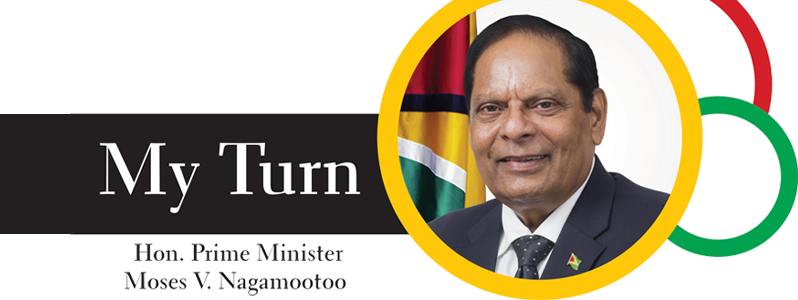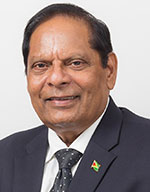IN his address to officers of the Guyana Defence Force (GDF) last Thursday, Commander-in-Chief and Guyana’s President David Granger stated that the force must maintain a state of readiness to secure our entire country and protect it from present and future foreign threats.
“The force,” he added, “is obligated to secure the state and safeguard the entire territory from invasion, incursion and insurrection. Incursions must be deterred; insurrections must be suppressed; the state must be secure.”
Speaking to the issue of rebellion, the retired Brigadier and former Chief of Staff of the Guyana Defence Force reminded officers about the 1969 Rupununi Uprising, which was suppressed by the army.
RUPUNUNI REBELLION
That rebellion was supported by foreign forces. It was described by the President, himself a brilliant historian/military strategist, as “the single most serious threat to the national integration, national security and territorial integrity of the state.”
He further referred to threats from Suriname and Venezuela to our New River Zone and to Western Essequibo, respectively.
After I had listened with rapt attention to the Guyanese President, I came away with the idea that My Turn for today would be dedicated to DAVID ARTHUR GRANGER. Except fleetingly sharing the same village and primary school during our childhood, I have not known the measure of the man who would be President and with whom I would be the running mate for the 2015 national elections.
I have since watched him at work, and I can say that we are fortunate to have him at the helm at a time, as he himself noted, when Guyana has become the victim to “claims on its territory despite international recognition of its land mass, territorial borders, territorial sea and exclusive economic zone”.
TRUE GRIT
As Commander-in-Chief, he knows from experience the true grit of our soldiers, and he has no reservation in certifying that the Guyana Defence Force “has been, and must always remain, ready to deter aggression, defend national sovereignty and ensure the development of our country as a safe, secure and strong state.”
It is testing times like these that we look for leadership from a tried and tested soldier for Guyana, who understands that threats are not only occurring in our maritime space, but also on land.
These include illegal mining, illegal logging, illegal arms and narcotics, trafficking in people and wildlife, and the smuggling of precious minerals.
In his keynote address, the President underlined that Guyana’s natural resources belong to our people – present and future generations. He emphasised, “Every citizen has the right to benefit from them. Our agricultural, fishing, forestry, mining and petroleum resources must be made more secure for our people’s profit and the country’s prosperity.”
Guyana’s defence policy stressed the ‘doctrine of total national defence.’ According to the President, all the elements and instruments of national power – economic, military, political, social and technological – will be employed in the interest of national security.
PROTECTION FROM CONSPIRACIES
National security has wide-ranging scope, and includes protection from conspiracies and incitement to overthrow a lawfully elected government.
The Commissioner of Police, Leslie James, must have had this in mind when he stated that investigations against Charrandass Persaud, was a matter of national security. Though he refrained from elaborating, I sensed that domestic security is just as important as external interference.
When I heard the leader of the opposition saying that the present elected government lacked legitimacy, I could not resist drawing an inference that more attempts would be made to unseat our Head of State and his government.
It was widely believed that to remove the President impeachment proceedings have to be filed under the controversial Article 180 of the Constitution. However, impeachment invariably requires a weighted majority of two-thirds and three-fourths of the elected members of the National Assembly. It was never contemplated that the President, together with his whole Cabinet, could be removed from office by a simple majority on a motion of no-confidence, but this is what the opposition wants us to believe.
HYBRID ELECTORAL SYSTEM
Guyana’s hybrid electoral system has spawned the 65 MPs who are drawn from lists of candidates for each of the contesting political parties. They are fielded from a combination of proportional representation (PR) and regional or geographical slates. There are 40 PR candidates and 25 regional candidates. The defector who crossed the floor was drawn from a regional/geographic list.
At the 2015 elections, the APNU+AFC coalition received in excess of 206,000 votes, and it was allotted 33 seats in the National Assembly. Those voters would not accept that a single rogue MP, coming from a regional slate, could conspire to bring down their government. What is revealing is that the MP did not only sell his assets and shut down his law practice that was located in his region. He was also loaded with U.S. currency, hence his gambling at a local casino and his scramble to lock down a million-dollar gold deal.
Though the police would not give details, all indications are that the man was bought, which made him cast what Guyanese widely believe to be an unlawful vote. The lay person, who is not versed in the law, sees it as an immoral or sin vote. They would punish the Jagdeo-PPP for that at any future poll.
But that could wait.
SHEER DESPERATION
What is of immediate interest to national security should be the fresh bout of frenzy from the opposition leader. Out of sheer desperation at grabbing political power, he is threatening to sabotage foreign investment in the sugar sector. He seemed opposed to divestment and modernisation which his own regime had canvassed as he now threatens to reverse any privatisation agreement. Such careless talk could destabilise the country. It could be exploited by anti-national elements, and it could render Guyana vulnerable to interference from external forces.
It is in this context that I fully share the advice of President Granger that Guyana needs “total national defence”. His strategic approach at the Officers Conference assures that Guyana is not only in safe and capable hands, but our security forces have a plan to combat external aggressors as well as domestic terrorists.
We cannot allow political desperation to take our country down the path of destabilisation.



.jpg)








